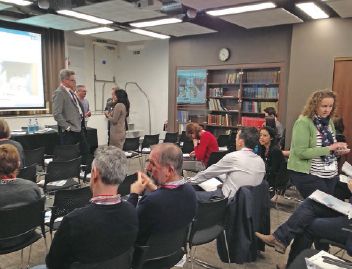
Physiology News Magazine
Report on The Physiological Society’s education and teaching theme workshop
Promoting and sharing excellence in Higher Education teaching
Events
Report on The Physiological Society’s education and teaching theme workshop
Promoting and sharing excellence in Higher Education teaching
Events
Nick Freestone
Associate Professor of Physiology,
Kingston University, UK
https://doi.org/10.36866/pn.102.16
“Good teachers possess certain virtues whose acquisition is a practical matter” (Winch, 2004)

On 15 January, The Physiological Society hosted the latest in their series of workshops with an Educational and Teaching theme at Hodgkin Huxley House, London. This event was held in conjunction with The Royal Society of Biology (RSB) and the British Pharmacological Society (BPS), whose participation underlined the increasing importance of education in the activities of these societies. Colleagues from universities across the whole of the UK (England, Scotland, Wales and the Republic of Ireland) arrived eager to be involved in sessions spanning both educational best practice and policy. As the date of this workshop coincided with the deadline for responses to the government’s Teaching Excellence Framework (TEF) Green Paper, delegates were particularly keen to hear from invited speakers who would be able to give a well-informed view of the government’s motivations in promoting TEF.
As a prelude to these policy discussions the morning session, ably chaired by Blair Grubb and Dave Lewis (winner of the Physiological Society’s Otto Hutter Teaching Prize in 2014), focussed on examples of best teaching practice, which was in keeping with the general theme of ‘teaching excellence’. The first speaker was a very fine exemplar of this motif, Dr Manasi Nandi, winner of the British Pharmacological Society’s Rang Prize for Excellence in Teaching, 2015. Manasi spoke eloquently about her commitment to understanding the learning needs of her students and how she reflected upon and changed her practice to enable all her students to reach their full potential.
After this masterclass on how to truly engage students with their learning a number of colleagues were involved in the ‘Swapshop Sessions’ – vignettes of 5 minutes duration and 5 minutes for discussion, giving everyone a flavour of the teaching innovations occurring in a number of settings across the UK. These talks covered topics as diverse as computer simulations, novel methods of assessing practical skills and student learning, improving feedback by using clickers or giving personalised feedback and use of Personal Development Plans, flipped lectures and online tutorials.
The lively discussions engendered by the morning’s session were carried over into lunch where participants were able to view posters and talk to their colleagues in a more informal manner. After a very plentiful lunch, participants were suitably refreshed to continue with the afternoon’s proceedings, which focussed on matters of education policy. These talks, expertly chaired by Mary Morrell, began with an overview of the HE work conducted by the Physiological Society, from Judy Harris, winner of the Otto Hutter Teaching Prize in 2015. Further perspectives on the current educational landscape were given by Ian McFadzean for the BPS and Jon Scott for the RSB (The HEA Bioscience Teacher of the Year in 2011). Bearing all these different perspectives in mind about what the learned societies were currently doing in terms of teaching practice it was an opportune time to hear about TEF from Nicolette Divecha, Assistant Director, Department for Business, Innovation and Skills (BIS) and Nick Hillman, Director of the Higher Education Policy Institute (HEPI) an independent HE think tank.
Nicolette has probably faced more hostile questioning from audiences in her difficult role explaining and defending the TEF but probably not such well-informed and reflective engagement as she received from the polite, collegial and knowledgeable participants of this workshop. It is fair to conclude however that many members of the audience thought that various elements of the suggested TEF proposals had not been well thought through and need further elaboration and clarity.
Nicolette then passed the baton on to a panel made up of the afternoon speakers and Nick Hillman who, in particular, was eminently well placed to contextualise the proposed TEF changes having previously been a Special Adviser at BIS as well as working for David Willetts and now being Director of HEPI. With his widespread knowledge of the sector and insider view of government machinery, Nick was an inspired choice to round off the proceedings and provided some reassurance to the audience of the benign intent of the proposed TEF changes.
All in all this was a fascinating day, mixing exposure to pedagogic best practice in HE with unfettered access to senior policy makers. The Physiological Society should be commended for its commitment to the educational aspects of its mission and the support and help it provides its members in these changing times.
